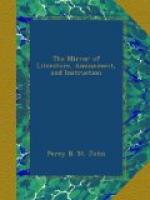By the way, how many of these wonders are recorded in the early volumes of the Philosophical Transactions, with all the gravity of the FF.R.S. whose zeal, industry, and emulation rendered the early years of the Society peculiarly brilliant. The very titles of some of the early papers would make a “wonderful museum;” as Four Suns observed in France—Worms that eat Stones and Mortar—which are almost as marvellous as one of Sir David Brewster’s lines—a coach and four filled with skeletons. The Royal Society has now existed a century and three-quarters: in their early Transactions are inquiries relative to the tides—observations on the darting threads of spiders—“experiments about respiration”—“of red snow seen at Genoa,” &c.; yet scores of philosophers, at the present moment, are controverting these very subjects.)
* * * * *
PILGRIMAGE THROUGH KHUZISTAN AND PERSIA.
(This is not just so good a work as its full title-page may lead the reader to expect. It runs thus “Fifteen Months’ Pilgrimage through untrodden tracts of Khuzistan and Persia, in a journey from India to England, through parts of Turkish Arabia, Persia, Armenia, Russia, and Germany.” Now, there is attractive promise in the word “untrodden,” and it may be said to apply to the Asiatic tour of the author, or his first volume, but is not appropriate to the second, which owes its main interest to his interview with Skryznecki, the illustrious Pole. Neither is the term pilgrimage characteristic of the journey, which has the sketchiness and levity of a flying tour rather than the observant gravity of a patient pilgrimage. Nevertheless, the work is altogether full of vivacity and interest, and the author, Mr. J.H. Stocqueler, must be as pleasant on his travels, as his book will be in our hands.
Crossing from Bombay, the author reached Muscat in eleven days. Here, with his host, Reuben, he paid his respects to his highness the Imaum, whose court is a curiosity.)
The Imaum’s palace was close to the water’s edge in front of the town, and his highness received Reuben and myself in an arbour or veranda open to the sea. At the entrance to the veranda stood several well dressed Arabs armed with sword, spear, and dagger, and half a dozen dirty looking Abyssinians clothed somewhat like the sepoys in our Indian army, and equipped much after the same fashion. These latter, as I understood, were paraded in honour of my visit; and indeed generally form the garde du corps on occasions of an Englishman’s presentation at the Court of Muscat. The Imaum rose on our entrance and accommodated us with chairs, and after we had been served with some insipid sherbet, addressed himself to me on the subject of my journey, its object and direction; and then touched on the politics of Europe.
Our interview closed by his highness offering me the use of his horses, his houses, and his ships of war, the cabins of which afforded excellent accommodation, and which were generally occupied by English visiters.




